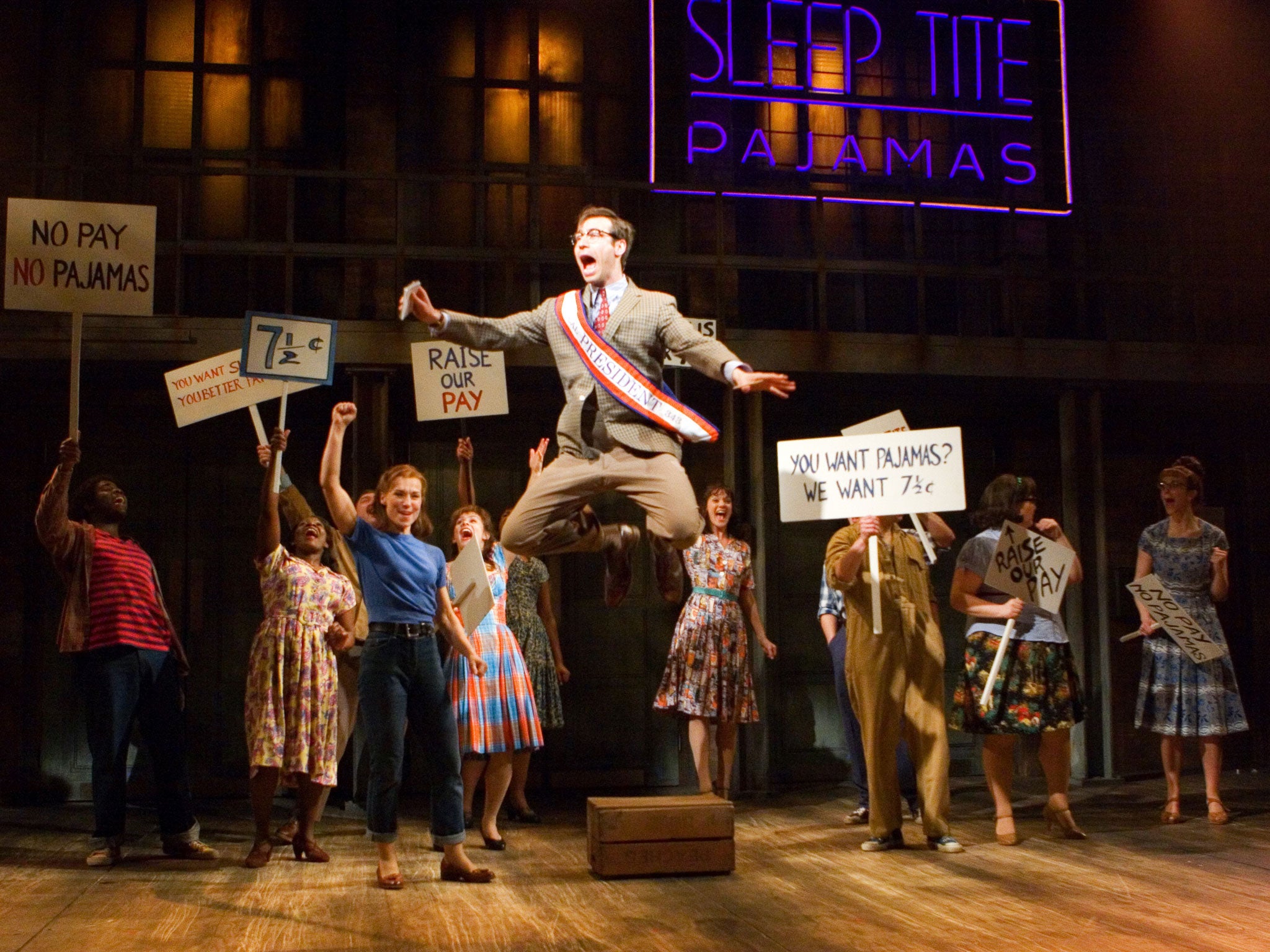Kate Bassett on The Pajama Game: Anyone for a little strike-and-dance?
Jean-Luc Godard called ‘The Pajama Game’ the first left-wing operetta – and in Richard Eyre’s hands, it’s a workers’ triumph

Our little life may be rounded with a sleep, as Shakespeare wrote poetically, but no one’s gonna be nodding off during The Pajama Game. As the factory whistle shrills at the start of Richard Eyre’s peppy revival of this 1954 Broadway musical, Babe (Joanna Riding) certainly isn’t about to tuck up in her PJs. She’s a trade union firecracker in a low-paid workforce manufacturing jammies at top speed.
The Sleep-Tite factory is a hive of activity as seamstresses, in gingham and floral prints, pile in through the swing doors and begin whirring at their sewing machines (fine, fluid set design by Tim Hatley). Peter Polycarpou, as the supervisor, Hines, bustles around like the White Rabbit, stopwatch in hand. An obsessive time-and-motion man, he launches into the opening number, “Racing with the Clock”, accompanied by jazzy, pattering cymbals and flurries of trumpets (the vibrant musical direction is by Gareth Valentine).
But this is no tract for Soviet-style socialist realism. The Pajama Game is tongue-in-cheek when Hines, in an aside, describes this as “a very serious drama” about capital and labour. It’s a romcom at heart, as Riding’s Babe and Hadley Fraser’s Sid – the boss’s right-hand man – fall for each other. It’s lightweight, given recent events in Bangladesh.
To cavil, some of the song-and-dance routines are superfluous while character developments are bemusingly compacted (George Abbott and Richard Bissell’s script boiling down a novel by the latter). Still, Jean-Luc Godard called this “the first left-wing operetta” and it is rather extraordinary. Babe turns militant in a labour dispute and separates from Sid until he switches sides. He discovers that the boss has lined his pockets while declaring pay rises impossible.
Politics aside, Eyre’s production is a blast in the intimate Minerva studio. Undeterred by its main house currently being a building site, Chichester Festival has produced another musical hit. Fraser raises the Minerva’s roof when he sings. Stephen Mear’s choreography is exuberant and droll. Richard Adler and Jerry Ross’s songs pastiche everything from barbershop to yodelling. Then, when Babe and Sid’s feelings find room to breathe, Riding and Fraser capture intense physical desire with startling naturalism.
FRÄULEIN JULIE (BARBICAN THEATRE, LONDON)
As director Katie Mitchell underlines in her programme notes for Fräulein Julie – aka Miss Julie – August Strindberg wanted to introduce revolutionary naturalism into late 19th-century theatre. Well, Mitchell’s multimedia German production (paying a flying visit last week from the Schaubühne in Berlin) has a big screen above the stage, showing a movie version of select bits from the play, with rigorously accurate period costumes and props. The acting is admirably understated, too, as the unstable heiress, Julie, and her father’s footman, Jean, succumb to ruinous lust below stairs – heedless of Jean’s fiancée, the kitchen maid Kristin.
In fact, the movie is being filmed live by onstage techies. The cast are only partly visible in the flesh, mostly upstage behind glass or in walled-off rooms. Downstage right, there’s another crew filming supplementary shots. On the left, a sound-effects duo synchronise with every onscreen move, sloshing water in a bowl, or rubbing feathers to suggest dried flowers rustling.
Mitchell has done all this before, in her adaptation of The Waves. This project strikes me as largely pointless and tediously, technically overworked. Kristin’s upset looms large, yet it leaves you cold. Mitchell loads her up with improbable, pseudo- poetic monologues. Sometimes Kristin takes a kip. Mmm, tempting.
THE TEMPEST (SHAKESPEARE’S GLOBE, LONDON)
In Jeremy Herrin’s Globe staging of The Tempest – with Roger Allam as Prospero – stocks are low regarding magic and the stuff that dreams are made on. Is the magus’s robe made of string vests? And when Colin Morgan’s wan Ariel transforms into a screeching harpy, are his monster claws meant to be laughably rubbery? Herrin’s directing is patchy. He lets the storm scene peter out, after a model ship bobs through the sea of groundlings, and he leaves Allam to ham up the famous speeches slightly, including the “rounded with a sleep” one.
Elsewhere, though, Allam is movingly tender towards Jessie Buckley’s Miranda, and winningly funny too. When it comes to her wedding, he turns Prospero’s possessive delays into a dad-behaving-badly running gag. She’s a charming, excitable innocent. Joshua James, as her gangly beloved, manages to be boyishly smug and ardent. Meanwhile, the clowning in the subplot nearly steals the show, with Sam Cox as a reeling drunk yet poker-backed butler, and Trevor Fox as the shipwrecked jester, wringing out his codpiece over the front row.
‘The Pajama Game’ (01243-781312) to 8 Jun. ‘The Tempest’ (020-7401 9919) to 18 Aug
CRITICS' CHOICE
At Wyndham’s, London (to 11 May), Doktor Glas is a world-class, gripping tale of lethally twisted love, performed (in Swedish with surtitles) by Wallander star Krister Henriksson. At the Arc, Stockton-on-Tees (Tue), catch Love Letters Straight from the Heart, a surprisingly poignant experimental piece, with actor-DJs reading out dedications to loved ones written (anonymously) by members of the audience.
Subscribe to Independent Premium to bookmark this article
Want to bookmark your favourite articles and stories to read or reference later? Start your Independent Premium subscription today.

Join our commenting forum
Join thought-provoking conversations, follow other Independent readers and see their replies